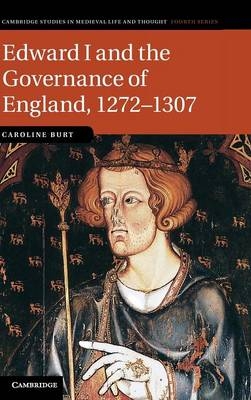
Edward I and the Governance of England, 1272–1307
Seiten
2012
Cambridge University Press (Verlag)
978-0-521-88999-5 (ISBN)
Cambridge University Press (Verlag)
978-0-521-88999-5 (ISBN)
An important exploration of the reign of Edward I – one of England's most lionised, feared and successful monarchs. Through three detailed case studies, Caroline Burt explores how his governance was reflected at a local level and re-evaluates his motivations and achievements, presenting an entirely new interpretation of his reign.
This important exploration of the reign of Edward I – one of England's most lionised, feared and successful monarchs – presents his kingship in a radical new light. Through detailed case studies of Shropshire, Warwickshire and Kent, Caroline Burt examines how Edward's governance at a national level was reflected in different localities. She employs novel methodology to measure levels of disorder and the effects of government action, and uncovers a remarkably sophisticated approach to governance. This study combines an empirical examination of government with an understanding of developing political ideas and ideological motivation, and contributes towards a greater understanding of the development of local government and politics in England in the thirteenth and fourteenth centuries. Edward emerges as a king with a coherent set of ideas about the governance of his realm, both intellectually and practically, whose achievements were even more remarkable than has previously been recognised.
This important exploration of the reign of Edward I – one of England's most lionised, feared and successful monarchs – presents his kingship in a radical new light. Through detailed case studies of Shropshire, Warwickshire and Kent, Caroline Burt examines how Edward's governance at a national level was reflected in different localities. She employs novel methodology to measure levels of disorder and the effects of government action, and uncovers a remarkably sophisticated approach to governance. This study combines an empirical examination of government with an understanding of developing political ideas and ideological motivation, and contributes towards a greater understanding of the development of local government and politics in England in the thirteenth and fourteenth centuries. Edward emerges as a king with a coherent set of ideas about the governance of his realm, both intellectually and practically, whose achievements were even more remarkable than has previously been recognised.
Caroline Burt is Fellow, Admissions Tutor and College Lecturer in History at Pembroke College, University of Cambridge.
List of maps; List of tables; List of figures; Acknowledgements; List of abbreviations; Introduction; Part I. Context: 1. Royal government; 2. Political ideas; 3. The localities: Shropshire, Warwickshire and Kent; Part II. Chronology: 4. Edward: the apprenticeship, 1254–72; 5. 1272–7; 6. 1278–85; 7. 1286–93; 8. 1294–1301; 9. 1302–7; Conclusion; Appendix: tables and figures; Bibliography.
| Reihe/Serie | Cambridge Studies in Medieval Life and Thought: Fourth Series |
|---|---|
| Zusatzinfo | 16 Tables, black and white; 9 Maps; 9 Halftones, black and white |
| Verlagsort | Cambridge |
| Sprache | englisch |
| Maße | 159 x 235 mm |
| Gewicht | 590 g |
| Themenwelt | Geschichte ► Allgemeine Geschichte ► Mittelalter |
| Geisteswissenschaften ► Geschichte ► Regional- / Ländergeschichte | |
| Geschichte ► Teilgebiete der Geschichte ► Militärgeschichte | |
| Recht / Steuern ► Rechtsgeschichte | |
| ISBN-10 | 0-521-88999-5 / 0521889995 |
| ISBN-13 | 978-0-521-88999-5 / 9780521889995 |
| Zustand | Neuware |
| Haben Sie eine Frage zum Produkt? |
Mehr entdecken
aus dem Bereich
aus dem Bereich
eine neue Geschichte des Mittelalters
Buch | Hardcover (2023)
C.H.Beck (Verlag)
CHF 53,20


